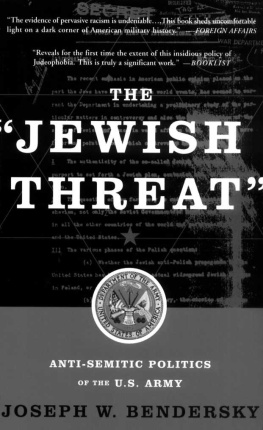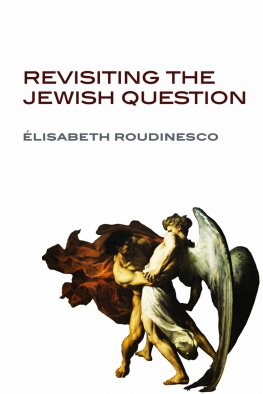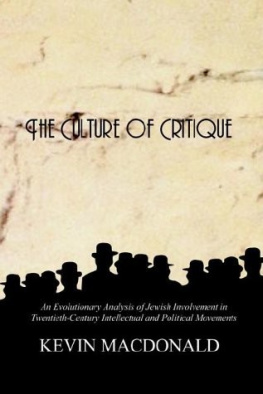PRAISE FOR THE JEWISH THREAT
"The 'Jewish Threat' is a significant contribution to our understanding of military intelligence policy and American politics during the 20th century. Joseph Bendersky sheds new light on the attitudes of America's military officers toward Nazi Germany, the Soviet Union, the Holocaust, and Jewish refugees, and he extends our understanding appreciably about American nativism, anti-radicalism, and anti-Semitism."
-ArHAN THEOHARIS, AUTHOR OF Boss: J. EDGAR HOOVER AND THE GREAT AMERICAN INQUISITION
"[O]ne of the finest studies that I have read about pervasive antisemitism in an American institution.... This superb book will certainly enlighten those who doubt the intensity of American hostility toward Jews in the first half of the twentieth century."
-I FONARD DINNERSTEIN, AUTHOR OF AMERICA AND THE SURVIVORS OF THE HOLOCAUST AND ANTISEMITISM IN AMERICA
"Be warned: this is, at times, a shocking book. It is also an extremely worthwhile read... simultaneously a disturbing and fascinating book."
-INTELL ECTUALCAPITAI..COM
"Anyone who identifies passionately with our American military and its veterans legion organizations, as I do, will he amazed at the U. S. Army's long tradition of racialism and how it wasn't ever the subject of a major book until now. This book... presents us with a rare opportunity to study that revelation."
-AMAZON.COM
"Bendersky makes it patently clear that such virulent anti-Semitism was endemic in the U.S. Army for at least the first half of the last century. And because these deeply entrenched beliefs were espoused by some of the highest-ranking officers in one of America's most powerful institutions, they had a significant effect on such matters as immigration, policies toward Jewish refugees from Nazi Germany, and the establishment of the state of Israel."
-WASHINGTON JEWISH WEEK
"The book is so provocative that it will stimulate great discussion.... It is a powerfully illuminating kind of analysis, an original work of research."
-THE JEWISH POST OF NEW YORK
Also by Joseph W. Bendersky
Carl Schmitt: Theorist for the Reich A History of Nazi Germany
Anti-Semitic Politics
of the U.S. Army
Joseph W. Bendersky





For
Carmen
Contents
Illustrations appear after pages 110, 222, and 366
Acknowledgments
As this book grew enormously in scope and ultimately took more than a decade to complete, I incurred debts to a variety of individuals and institutions. Without their professional assistance, financial support, or hospitality and kindness the extensive work required for a book of this kind would have been impossible. The necessary research was very timeconsuming and involved travel to archives across the country as well as innumerable trips to the National Archives. A fellowship from the National Endowment for the Humanities allowed me to devote a year entirely to this study. Further research was supported by grants from the American Council of Learned Societies, American Philosophical Society, and Holocaust Educational Foundation. I would also like to thank Virginia Commonwealth University for a Grant-in-Aid and Terry Oggel, former associate dean of the College of Humanities and Sciences, for providing travel funds at an early stage of the project.
Although it is not possible to identify all of them individually, a debt of gratitude is owed to the archivists and staff of the numerous archives listed in the bibliography. All scholars know the vital, though too often unrecognized, role that archivists play in the historical discipline. In this regard, I would like especially to thank Richard J. Sommers, David Keough, and Pamela Cheney of the U.S. Military History Institute at the U.S. Army War College, Carlisle, Pennsylvania. Over a period of years, David Keough in particular provided invaluable guidance, insight, and professional judgment concerning documentation and research strategies in key areas of my work. Numerous archivists at the National Archives were also helpful. However; I would like to express my sincere thanks for the assistance of John Taylor and Richard Boylan. They were both instrumental not only in finding the sources I had identified but also in opening up entirely new avenues of extremely valuable investigation. Every scholar who has had the privilege of working with them knows exactly what I mean. On numerous occasions the Interlibrary Loan Department at Virginia Commonwealth University was very helpful in securing sources for me.
Several colleagues and scholars provided important support, advice, and encouragement. My departmental colleague Melvin I. Urofsky, Athan Theoharis of Marquette University, and George Schwab of the Graduate Center of the City University of New York understood the importance of this study even before much of the most revealing documentation had been uncovered. Their professional support at this early stage of development was crucial. I certainly would like to thank the chairs of my department, George E. Munro and Susan E. Kennedy, for their patience and understanding while I devoted myself to such a long-term project. Nancy Campbell was quite helpful in working out the technological problems of manuscript preparation. Sam Bullock, Krister Johnson, Josh Katz, Lynn Shepherd, and Pat Webber also worked on various stages of the project. The Department of History of Ben-Gurion University of the Negev in Israel, particularly Robert Liberles and Ilan Troen, deserve thanks for offering me the opportunity to present my findings to their faculty and students.
As I approached the publication stage, Benton Arnovitz kindly shared the fruits of his years of experience in the publishing world. I would like to extend my sincere appreciation to my literary agent, Jim Hornfischer, to Don Fehr, senior editor at Basic Books, and to John Bergez, whose incisive reading, commentary, and thoughtful editing greatly enhanced the quality of the book.
Even with the financial resources provided by grants and fellowships the research for this book could not have been completed without the hospitality shown by Mike and Ann Bendersky during my frequent trips to Washington for almost a decade. Machi and Greg Dilworth were equally kind in accommodating me over the years of research. Certainly my wife, Carmen, and my daughters, Karen and Nicole, deserve a great deal of thanks for their understanding during my frequent and often long trips, as well as for tolerating the years I spent in the office writing this book. The essential contribution of George Bock to my work has gone unrecognized for too long; he is an undeniable example that altruistic individuals do exist. I would never have published a single word without his teaching and assistance many years ago.











